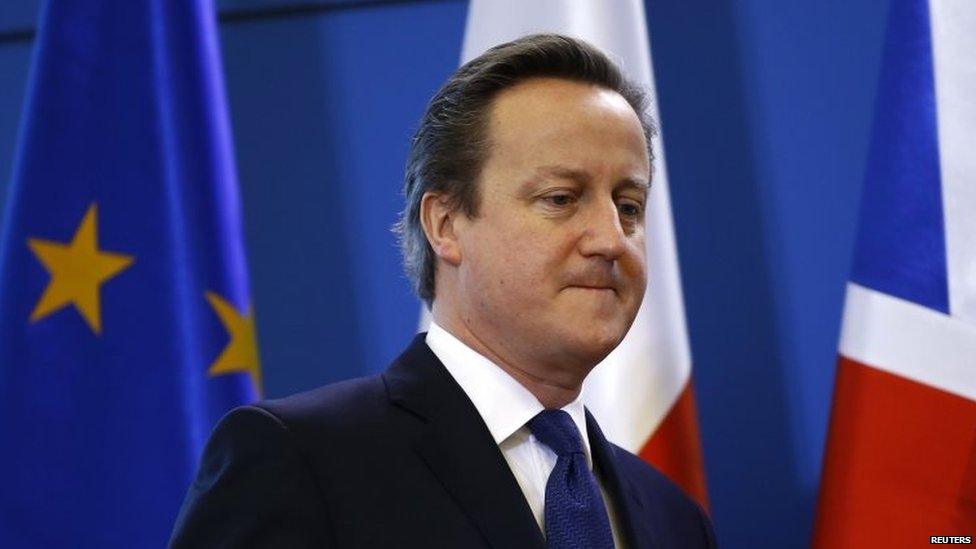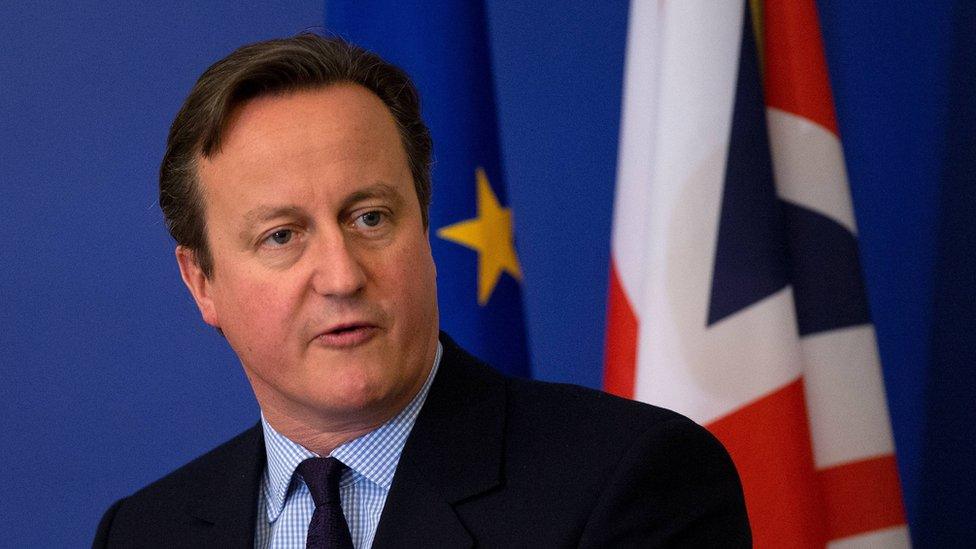EU referendum: David Cameron's benefit ban options
- Published

David Cameron's proposal to ban migrants from claiming in-work benefits for four years is proving to be a major sticking point as he seeks to renegotiate Britain's membership of the EU ahead of a referendum. The prime minister is now said to be open to other ideas aimed at cutting immigration "pull factors" - but what are they?

An "emergency brake" on benefits
How it would work: Details are still being worked out but it is thought that the UK, or any other member state, could apply to the European Commission for a temporary ban on in-work benefits for new arrivals. The European Commission would perform tests on whether a brake in benefit payments was acceptable. The member state would have to prove that its welfare system was being placed under intolerable strain by excessive immigration.
Will the EU accept it: Central European member states would probably rather have no possibility of in-work benefits curbs, but may swallow this as a price of keeping the UK in the EU. It would be something that would be available to all member states, not just the UK. And the "emergency brake" would have to be agreed by a majority of the 27 other member states before being applied.
What critics will say: British Eurosceptics will not wear the proposal currently being discussed. John Redwood said it "insult to the UK" and not a serious offer". He said Britain would have to beg other countries in certain circumstances to impose a temporary halt on benefits, a plan he dismissed as a "bad joke".
Targeting the unemployed

How it would work: Banning first time EU jobseekers from claiming out-of-work benefits. Cutting the length of time EU migrants can claim benefits when they lose their job. At the moment, EU citizens working in the UK for three years are entitled to Jobseekers Allowance and housing benefit for six months. The IPPR think tank has suggested this Housing Benefit limit should be cut to three months - something that the EU is already considering.
Will the EU accept it: The Poles and other EU nations opposed to Mr Cameron's existing plans could go for this. It would not, in theory, threaten the principle of free movement because it only applies to jobless migrants. It could also be done without treaty change.
What critics will say: Mr Cameron's plan to ban migrants from claiming in-work benefits and child benefit for four years is a Tory manifesto commitment. So he would be accused of breaking a promise to the electorate.
A shorter benefits ban

How it could work: The length of time migrant workers have to pay into the system before they can claim tax credits and other in-work benefits could be reduced from four years. The Labour Party called for a two year ban at the general election, although Britain's top civil servant, Sir Jeremy Heywood, has warned ministers any ban lasting longer than six months could be discriminatory and it may have to be cut to a "few weeks or months".
Will the EU accept it: It would be tough to get agreement from the East European nations, who would still view it as direct discrimination against their citizens.
What critics will say: See above - they would accuse Mr Cameron of a humiliating climb down.
Restrictions on British expatriates

How it would work: British citizens returning from abroad after a certain number of years would be subject to the same in-work benefit restrictions as EU migrant workers in the UK.
Will the EU accept it: The European Commission has responded positively to the suggestion, according to the Telegraph., external
What critics will say: Mr Cameron will be accused by Eurosceptics of watering down his demands to save his floundering EU negotiations - and unfairly targeting expats, who might have paid into the system before moving to another EU nation.
'Emergency brake' on immigration

How it would work: Temporary controls on EU migration if the flow is judged to be too large.
Will the EU accept it: Potentially. Brakes in other EU policy areas have been allowed and the Eastern European countries are reportedly open to the idea.
What critics will say: Unlikely to reassure Eurosceptics, who will say Britain still does not have control of its own borders, particularly if the "emergency brake" is policed by the EU. UK officials are reported by the FT to be sceptical about the idea, external, seeing it as an attempt by EU officials to muddy the immigration debate.
Cutting benefits for all

How it could work: The four-year ban on claiming in-work benefits, such as tax credits, could be extended to all UK benefit applicants from the age of 18. In practice this would mean British young people would not be able to claim until they were 22. Downing Street ruled out this option after analysis that it would lead to 300,000 Britons losing benefit entitlement.
Will the EU accept it: It would not be viewed as discrimination by other EU countries, who are reported to have told Mr Cameron it is the only way they would accept his four-year ban.
What critics will say: The government would be accused of unfairly targeting British young people. The idea was originally suggested by Foreign Secretary Philip Hammond as a joke, according to The Guardian, but documents seen by the BBC suggest it was being seriously considered.
A residency test

How it could work: In-work benefit claimants would have to prove they have lived in the UK for four years. Analysis suggests this would affect 50,000 British claimants.
Will the EU accept it: Possibly.
What critics will say: Some ministers are said to be against any compromise that waters down the Conservatives' manifesto commitment.
UK's EU referendum in-depth

- Published15 December 2015

- Published8 December 2015
- Published14 December 2015

- Published30 December 2020

- Published17 February 2016
